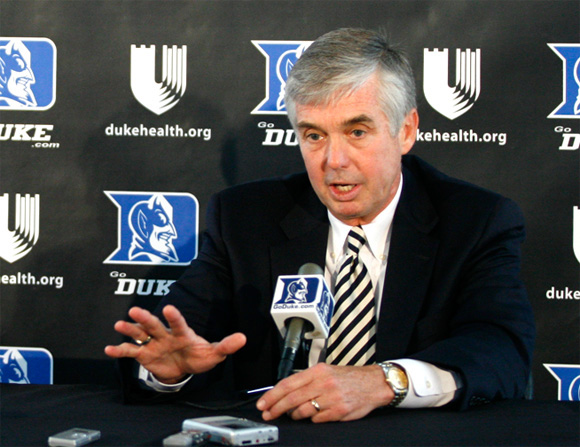
Last Tuesday, I sat down with Kevin White, Duke's first-year athletic director, to discuss how the Department of Athletics was planning to respond to the national economic downturn. White is in a unique position to answer any questions pertaining to the economics of college athletics—he has taught a business school class called "Business of Sport" for the past 26 years, and will do so again at the Fuqua School of Business this spring. Below are excerpts from our conversation.
What are the general effects you expect to see from the falling markets?
Historically speaking, Duke has been rather conservative. If you take a look at our expense budget compared to our counterparts, we've always been rather conservative. I don't think there's an awful lot of excess spending going on at Duke, anywhere. But with all that said, when you have economic times like we're facing, it causes you to behave a little differently. It certainly has an impact on individuals, organizations, non-profits, for-profits, whatever. All sectors are pretty significantly challenged at this point. Anyway, with all that said, does your financial behavior from an expense budget standpoint become modified in times like these? Absolutely.
How does a time like this affect charitable giving and fundraising from an athletic department's perspective?
We would be insensitive to move into the external constituency groups and try to generate lots of resources for intercollegiate athletics. You and I represent an institution that's pretty aspirational. Last time I checked, nothing around here isn't trying to be really good and excellent and everything-every entity on campus needs more resources. But this isn't the time to go out, and I don't believe it's the time to go out and try to generate more resources for those well-stated aspirations that appear in the Strategic Plan. But there are a lot of things we can do. There's a lot of pre-game activity that can go on. It's not like we don't need to think about moving forward, but we need to do an awful lot of planning, cultivating, thinking about future prospects-and when the economy improves, benefaction will occur. We will get through this period, and when benefaction occurs, we'll be in a position to move forward.
Are any teams more insulated from a recession than other? Would a sport like men's basketball be in a better position than any non-revenue Olympic sport?
I would state it just as simply as, I don't think intercollegiate athletics is recession-proof as an enterprise. Higher education certainly isn't. I think every team, every program within intercollegiate athletics, needs to modify behavior during these challenging times.
Is Duke in a better position to endure a tough economic period because it's not reliant on one major donor like, say, Oklahoma State's relationship with T. Boone Pickens?
One could make an argument for both sides of that. Our base of support is big. It's very strong, and it's comprehensive, so I suspect the ebb and flow at Duke will be less dramatic than if we were reliant on one or two high-end benefactors.
Get The Chronicle straight to your inbox
Signup for our weekly newsletter. Cancel at any time.
